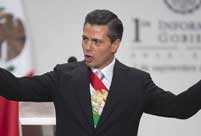 China's new-type guided missile frigate 'Bengbu' in live fire training
China's new-type guided missile frigate 'Bengbu' in live fire training
 China’s weekly story (2013.8.10 - 8.23)
China’s weekly story (2013.8.10 - 8.23)
 Flight team performs first show abroad
Flight team performs first show abroad
 With parents bedridden, 12-year-old boy becomes pillar of the family
With parents bedridden, 12-year-old boy becomes pillar of the family
 Top 10 private Chinese enterprises 2013
Top 10 private Chinese enterprises 2013
 The most gorgeous Chinese women in the eyes of foreigners
The most gorgeous Chinese women in the eyes of foreigners
The beginning of autumn finds the EU in an awkward position as far as its international role is concerned. The alleged use of chemical weapons by the Bashar al-Assad regime has generated a debate on how the West should respond.
In theory, Europe does not favor military action and prefers diplomatic solutions. The Chair of the European Parliament's Committee on Foreign Affairs, Elmar Brok, for example, emphasizes the significance of negotiations and warns of the risks of a potential military imbroglio.
But peace-loving statements mean little compared to action. In particular, Britain and France, in cooperation with the US, have been leading Western efforts for a military response against Assad, even if this will be a small-scale operation. Germany, on the other hand, disagrees with this approach and has made it clear it is not prepared to contribute. For their part, smaller European states have almost no say and will be only asked by the US to provide assistance by giving permission for the usage of their military facilities and airspace as members of NATO.
It is not the first time Europe has faced internal divisions blocking a possible coordinated action. Military intervention as a policy choice in dealing with international crises is often discussed in Brussels.
Since the fall of the Berlin Wall and the collapse of the global bipolar structure, Europe has attempted to take its first steps in creating a common foreign and defense policy. Its main objective is to complement the action of the US or, in a more optimistic view, to proceed further, undertake its own initiatives and counterbalance the US.
So far these efforts have been unsuccessful, perhaps simply because the EU does not constitute a state itself. Instead, it is composed of 28 different countries which have different foreign policy priorities and are able to use their veto power in order to defend their national interests.
But even if attention is only paid to the stronger powers of Europe, namely Britain, France and Germany, they have a record of disagreeing rather than finding common ground.
In particular, London traditionally tends to follow the policy of Washington as both sides operate within the framework of their "special relationship." For its part, Paris often links its foreign policy choices to domestic challenges and seeks to demonstrate assertiveness in its international politics, influenced by the principles of its former president Charles de Gaulle. Finally, Berlin is still scarred by the trauma of WWII and generally opposes the use of violence in the international arena.
Germany is the only European country from the "Big Three" that focuses on the importance of international law and relies on the necessity of a mandate from the UN to undertake international action. The policy of France is slightly different. Although the country prefers to follow the UN route, it has violated some UN decisions in the past. British Prime Minister David Cameron, by contrast, was prepared to apply the US paradigm of unilateralism according to its national interests, ignoring international institutions, until he was firmly checked by the British Parliament.
Meanwhile French President François Hollande advocates for a military operation in order to strengthen his profile, improve his negative image and distract public opinion's attention from domestic thorns such as the course of the economy and the unemployment.
On the opposite side, German Chancellor Angela Merkel has expressed her anti-war stance, not only respecting her country's postwar principles, but also avoiding an unknown adventure in view of the national elections of September 22. What is even more problematic for the EU is that it fails to take a clear position against a military campaign which cannot be fully justified. A war against Assad in Syria lacks specific strategic goals and will be hardly turned into a political victory.
The bombardment of Libya in 2011, for instance, has not led to stability and liberal peace in the country but to new rounds of violence and uncertainty. Although history repeats itself, Europe seems to ignore these lessons.
The author is a research fellow at the Hellenic Foundation for European and Foreign Policy. opinion@globaltimes.com.cn
 Mexican president delivers first State of Nation address
Mexican president delivers first State of Nation address Highlights of MAKS 2013 Int'l Aviation and Space Show
Highlights of MAKS 2013 Int'l Aviation and Space Show  10th China-ASEAN Expo opens in Nanning
10th China-ASEAN Expo opens in Nanning Baby born to save his sister - the story of a savior sibling
Baby born to save his sister - the story of a savior sibling Lady of mystery: Female SWAT team in prison disclosed
Lady of mystery: Female SWAT team in prison disclosed  Single mother, baby live in KFC restaurant for months
Single mother, baby live in KFC restaurant for months Top 10 naked hotels in the world
Top 10 naked hotels in the world The most gorgeous Chinese women in the eyes of foreigners
The most gorgeous Chinese women in the eyes of foreigners A collection of bizarre rooftop buildings around China
A collection of bizarre rooftop buildings around China Putin intimate contacts with marine animals
Putin intimate contacts with marine animals China's frigate 'Bengbu'in fire training
China's frigate 'Bengbu'in fire training Fresh students 'forced' to register in university independently
Fresh students 'forced' to register in university independently 2013 Taiwan Int'l Tourism Expo kicks off in Taipei
2013 Taiwan Int'l Tourism Expo kicks off in Taipei Photo story: Take a gap year
Photo story: Take a gap year Nokia's Global Headquarters: visiting a declining empire
Nokia's Global Headquarters: visiting a declining empireDay|Week|Month